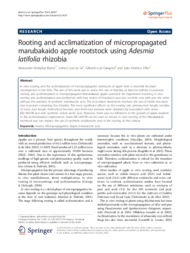Rooting and acclimatization of micropropagated marubakaido apple rootstock using Adesmia latifolia rhizobia.
Rooting and acclimatization of micropropagated marubakaido apple rootstock using Adesmia latifolia rhizobia.
Author(s): MUNIZ, A. W.
Summary: In vitro rooting and the acclimatization of micropropagated rootstocks of apple trees is essential for plant development in the field. The aim of this work was to assess the use of rhizobia of Adesmia latifolia to promote rooting and acclimatization in micropropagated Marubakaido apple rootstock. An experiment involving in vitro rooting and acclimatization was performed with four strains of rhizobium and two controls, one with and the other without the addition of synthetic indoleacetic acid. The inoculated treatments involved the use of sterile inoculum and inoculum containing live rhizobia. The most significant effects on the rooting rate, primary-root length, number of roots, root length, fresh-shoot biomass, and fresh-root biomass were obtained by inoculation with strain EEL16010B and with synthetic indole acetic acid. However, there was no difference in the growth of apple explants in the acclimatization experiments. Strain EEL16010B can be used to induce in vitro rooting of the Marubakaido rootstock and can replace the use of synthetic indoleacetic acid in the rooting of this cultivar.
Publication year: 2013
Types of publication: Journal article
Unit: Embrapa Western Amazon
Keywords: Apple, Indoleacetic acid, Maçã, Micropropagação, auxins, micropropagation
Observation
Some of Embrapa's publications are published as ePub files. To read them, use or download one of the following free software options to your computer or mobile device. Android: Google Play Books; IOS: iBooks; Windows and Linux: Calibre.
Access other publications
Access the Agricultural Research Database (BDPA) to consult Embrapa's full library collection and records.
Visit Embrapa Bookstore to purchase books and other publications sold by Embrapa.

